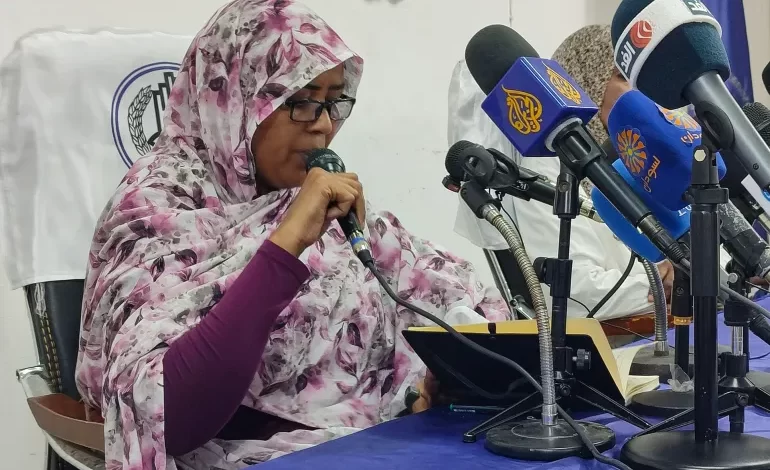By the Numbers: Grave Violations Against Sudanese Women Amid War

The ongoing war in Sudan, now in its second year, has cast a dark shadow over the lives of millions. Yet, women have borne the brunt of this bloody conflict, facing hunger, displacement, lack of basic care, and a dramatic increase in gender-based violence, according to recent United Nations reports.
During a press conference held by the Sudanese government on Saturday in the city of Port Sudan, advisor Rawda Abdel Qader, a member of the National Committee for Investigating Violations of National and International Humanitarian Law, revealed that more than 120,000 criminal complaints have been filed since the war began. Around 4,000 of these cases have been referred to court.
Rawda added that the investigation committee documented 1,392 cases of sexual violence against women across several states, based on a report from the Unit for Combating Violence Against Women and Children. These include gang rapes, sexual slavery, enforced disappearances, as well as forced pregnancies and marriages.
Figures Don’t Reflect Reality
“The reported numbers represent only 2% of the actual violations on the ground,” Rawda explained, noting that “the Rapid Support Forces (RSF) have used sexual violence as a weapon to humiliate civilians based on ethnic identity and forcibly displace them from their homes.”
She emphasized that such acts are classified under both national and international law as “crimes against humanity and war crimes,” constituting flagrant violations of fundamental human rights, including bodily dignity, equality, and non-discrimination.
Rawda also highlighted the signing of a new cooperation framework between Sudan and the United Nations on April 15, aimed at preventing sexual violence in conflicts, addressing stigma, and ensuring criminal accountability for perpetrators.
Protection Centers
Dr. Malak Dafallah El-Sayed, Acting Undersecretary of the Ministry of Social Development, described the violations against Sudanese women as “part of an attempt to alter the country’s demographic structure.”
She warned that “the international community may use the issue of physical violations against women as a gateway to interfere in Sudanese internal affairs.” She also referenced the recently discovered mass graves in the Abu Saad area, which contained the remains of 462 individuals—husbands, sons, or sisters of Sudanese women.
Dr. Malak confirmed that the ministry has begun implementing UN Security Council Resolution 1325, which focuses on protecting women in conflict zones. This includes establishing safety and social protection centers in several states. She pointed out that these centers “operate quietly and without media noise, in respect of the community’s values of modesty and dignity.”
Social Stigma and Barriers to Justice
Faki Al-Daw, head of the National Committee’s Investigation Division and Public Prosecutor in the Red Sea State, stressed that “women are the most affected group by the violations and practices of the Rapid Support Forces.”
He stated that the RSF committed all forms of violations stipulated in national and international laws, including systematic sexual violence, sexual slavery, and enforced disappearances.
One of the biggest challenges to achieving justice, he noted, is “the fear of social stigma, which prevents many women from reporting sexual crimes.” To address this, the committee has deployed teams of female prosecutors to shelters to receive complaints in complete confidentiality and provide guarantees for survivors’ protection.
Plans to Protect Civilians
Khalil Pasha Sayrin, Minister of Interior and head of the National Mechanism for Civilian Protection, emphasized that “protecting civilians during conflicts requires adherence to international humanitarian law, human rights agreements, and holding violators accountable.”
He highlighted the risks civilians face during war: killing, sexual violence, injuries from indiscriminate attacks, deprivation of water and food, destruction of vital infrastructure, and forced displacement. “The Rapid Support Forces have committed all these violations in an unprecedented manner,” he said.
Sayrin explained that the Sudanese government has developed a national plan to protect civilians, which was submitted as a reference document to the UN Security Council. It includes a range of measures, such as enhancing the capabilities of government institutions, providing security protection and essential services, protecting human rights, and ensuring impunity is not tolerated.
He also noted that the plan includes deploying police forces across Khartoum State, strengthening humanitarian efforts, combating violence against women and children, addressing the needs of displaced persons, enhancing the judiciary, and supporting reconciliation and reconstruction efforts.



